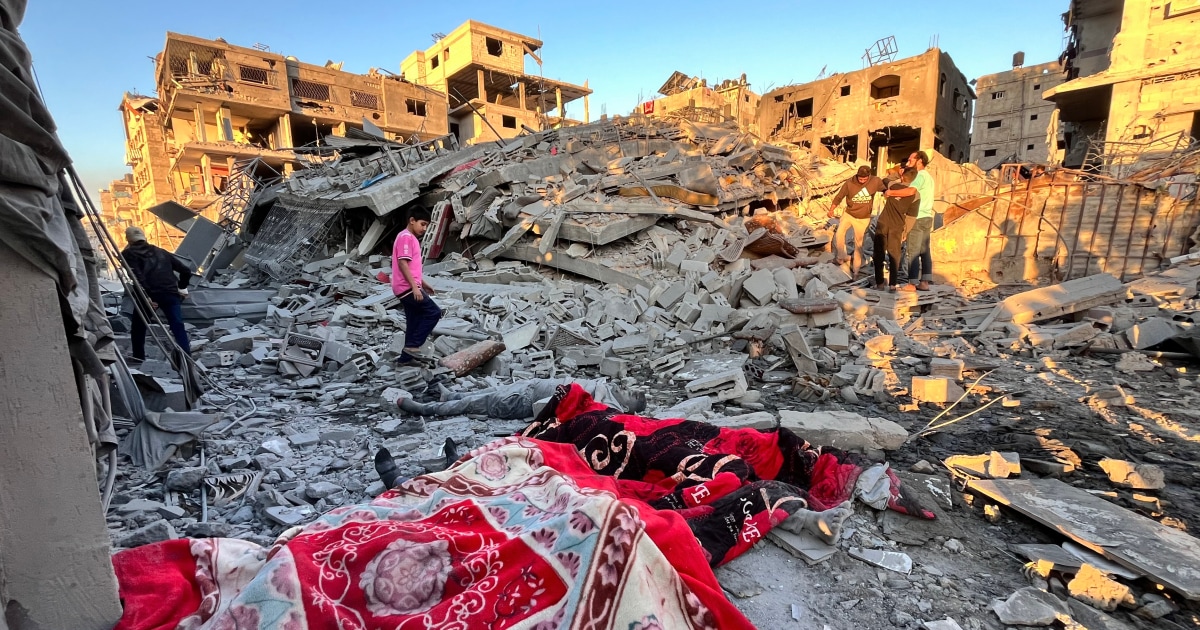Scores killed by Israeli strikes on Gaza; suspects arrested for firing flares at Netanyahu’s house
Israeli air strikes overnight and into Sunday have killed scores in Gaza, according to local health officials, as police in Israel arrested three suspects after flares were fired at Prime Minister Benjamin Netanyahu’s home in the city of Caesarea.
The Israeli military also advanced further north into Lebanon as Hezbollah forces mull a U.S. brokered cease-fire agreement that would bring an end to 13 months of exchanges of fire between the two sides.
The Israel Defense Forces’ latest attacks on northern Gaza’s besieged city of Beit Lahiya killed “about 100” people, Mahmoud Basal, a spokesperson for Gaza’s Civil Defense told NBC News on Sunday, offering a preliminary estimate as emergency crews continue rescue operations.
Basal said 60 people were killed after the IDF bombed houses in the city Sunday morning, and that “dozens are under the rubble.” He said strikes at dawn had killed a further 24 people.
NBC News has reached out to the IDF for comment.
For the past month, Israeli troops have moved tens of thousands of people from areas in the north of the enclave as they have sought to destroy Hamas forces, which the military says have been reforming around the cities of Jabalia, Beit Lahiya and Beit Hanoun.
On Saturday, an Israeli strike killed 10 Palestinians and wounded at least 20 others at the United Nations-run Abu Assi school in Gaza City’s Shati refugee camp currently sheltering displaced families, according to local officials. Basal told NBC News on Saturday that women and children were among the dead.
In Israel, Netanyahu and his family were not at the residence when two flares were fired at the building overnight and fell into the garden, according to a police statement.
The police did not provide details about the suspects behind the attack, but officials pointed to domestic political critics of Netanyahu, who has come under fire in Israel over his failure to reach a deal with Hamas to release the hostages still inside Gaza, while continuing to wage an unrelenting war in the enclave.
Israeli Defense Minister Israel Katz said the incident crossed “all red lines” in a post on X early on Sunday.
“It is not possible for the Prime Minister of Israel, who is threatened by Iran and its proxies who are trying to assassinate him, to be subject to the same threats from home,” he said.
On Sunday morning, protesters blocked the entrance to Netanyahu’s office building in Jerusalem, according to local media. It said the protestors were demanding his resignation, as well as a deal to swap Israelis held captive in Gaza with Palestinian prisoners in Israel.
In Lebanon, Israeli ground forces reached their deepest point in the nation since their invasion began six weeks ago, before pulling back on Saturday after clashes with Hezbollah troops, Lebanese state media reported.
It said IDF troops briefly captured a hill in the southern village of Chamaa, about three miles from the border, and destroyed the Shrine of Shimon the Prophet in the village. NBC News could not verify the reports.
Israel also continued its aerial bombardment in Lebanon over the weekend and issued fresh evacuation orders for Beirut’s Haret Hreik suburb.
The latest attacks come as Israel waits on Hezbollah to respond to a U.S.-brokered cease-fire proposal that would see the IDF withdraw from Lebanon and Hezbollah forces pull back to north of the Litani River, which runs about 20 miles from Lebanon’s southern border with Israel.
The U.S. ambassador to Lebanon submitted a draft truce proposal to halt fighting between Hezbollah and Israel to Lebanon’s parliament speaker Nabih Berri on Thursday, an adviser to the speaker, Ali Hamdan, told NBC News. The Reuters news agency first reported the proposal.
The deal also calls for the full implementation of U.N. Security Council Resolution 1701, which put an end to Israel’s 34-day invasion of Lebanon in 2006 by calling on both Israeli and Hezbollah forces to withdraw, while the Lebanese army and U.N. peacekeepers would be the only armed forces south of Lebanon’s Litani River.
According to Lebanon’s health ministry, Israeli attacks have killed at least 3,400 people in the country. A World Bank report estimated the cost of physical damage and economic losses due to the conflict in Lebanon at $8.5 billion.
Hezbollah attacks have killed about 100 civilians and soldiers in northern Israel, the Israeli-occupied Golan Heights and southern Lebanon over the last year, according to Israel.
But hopes of a cease-fire had been buoyed before, notably late last month when Lebanon’s prime minister expressed optimism a cease-fire could be reached before the end of October.
The latest efforts come as the Biden administration makes a push for peace in the waning time before President-elect Donald Trump takes office in January.


